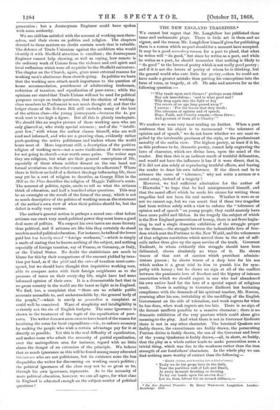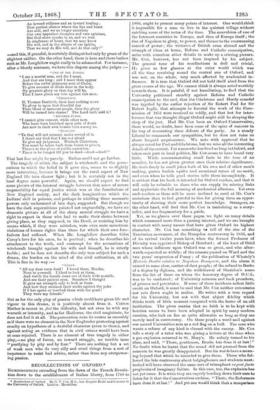THE NEW ENGLAND TRAGEDIES.*
WE cannot but regret that Mr. Longfellow has published these tame and undramatic plays. There is little art in them and no vigour, and the reason Mr. Longfellow himself gives for publishing them is a reason which no poet should for a moment have accepted. It may be a good secondary reason for a poet to plead, that what
he writes will "do good," but since he writes as a poet, and while he writes as a poet, he should remember that nothing is likely to "do good" to the lovers of poetry which is not really good poetry ; and if it is not the lovers of poetry of whom he is thinking, but the general world who care little for poetry,—then he could not have made a greater mistake than putting his conceptions into the form of verse, or tragedy, at all. He asks and answers for us the following question :—
" ' Why touch upon such themes ?' perhaps some friend
May ask incredulous ; 'and to what good end ?
Why drag again into the light of day Tho errors of an age long passed away ?' I answer : For the lesson that they teach; The tolerance of opinion and of speech. Hope, Faith, and Charity remain,—these three; And greatest of them all is Charity.'"
We confess we were very near reading no further. When a poet confesses that his object is to recommend the tolerance of opinion and of speech," we do not know whether we are most re- pelled by time intolerable prosiness of the style, or the predominant morality of the end in view. The highest poetry, at least if it be, as this professes to be, dramatic poetry, cannot help engraving the laws of character, which are divine laws, upon the mind of the reader. But then this is an indirect result of truthful delineation, and would not have the influence it has if it were direct, that is, if it did not aim solely at reproducing truthful effects, and leaving the reader to draw his own inference. If the direct end be to advance the cause of "tolerance," why not write a sermon or a moral essay, instead of a tragedy ?
However, we had sufficient admiration for the author of
" Hiawatha " to hope that he had misrepresented himself, and that the moral effect which he made his excuse for writing these
tragedies had not been his real motive. Whether it were so or not we cannot say, but we can assert that if these two tragedies had been written solely with a view to enforce the "tolerance of opinion and of speech" on young people, they could scarcely have been more pallid and lifeless. In the tragedy the subject of which is the New England persecutions of heresy, there is not from begin- ning to end a single dramatic exhibition of the struggle proper to the theme,—the struggle between the indomitable love of free- dom which sent the Puritans to the New World, and the vehemence of that religious conviction which nerved them to the act of self- exile rather than give up the open service of the truth. Governor Endicott, in whom evidently this struggle should have been delineated, shows absolutely no trace of it. He shows traces of that sort of caution which provident adminis- trators possess ; he shows traces of a deep love for his son
which makes it a great trial to him to punish him for sym- pathy with heresy ; but he shows no sign at all of the conflict
between the passionate love of freedom and the bigotry of intense conviction which we should expect in one who had abandoned his own native land for the love of a special aspect of religious truth. There is nothing in Governor Endicott but hesitating compliance with the demands of his spiritual teacher, Mr. Norton, yearning after his son, irritability at the meddling of the English Government on the side of toleration, and weak regrets for what he has done, when weak regrets are too late. There is no sign of the fiercest conflicts possible to a massive character ; there is no dramatic exhibition of the very passions which could alone give meaning to the play. And what there is not in Governor Endicott there is not in any other character. The heretical Quakers are feebly drawn, the executioners are feebly drawn, the persecuting Puritan divine is feebly drawn, the son of the Governor and lover of the young Quakeress is feebly drawn,—all, in short, so feebly, that the play as a whole rather tends to make persecution seem a trivial thing, which was due to the weakness rather than the iron strength of our forefathers' characters. In the whole play we can find nothing more worthy of extract than the following-
" EDITH (rising, and breaking into a Lind of chant),
"Truly we do but grope hero in the dark, Near the partition wall of Life and Death, At every moment dreading or desiring To lay our hands upon the unseen door !
Let us, then, labour for an inward stillness,—
The Yea England Tragedies. By Henry Wadsworth Longfellow. London : Boutledge. 1868.
An inward stillness and an inward healing ; That perfect silence where the lips and heart Are still, and we no longer entertain Our own imperfect thoughts and vain opinions, But God alone speaks in us, and we wait In singleness of heart, that we may know His will, and in the silence of our spirits, That we may do His will, and do that only !"
--and this, if graceful, is certainly distinguished only by grace of the slightest calibre. On the other hand, there is here and there bathos such as Mr. Longfellow ought really to be ashamed of. For instance, after a bloody sentence, we have this dispute among the judges
ONE OF THE JUDGES.
"I am a mortal man, and die I mast,
And that ere long ; and I must then appear Before the awful judgment-seat of Christ, To give account of deeds done in the body. My greatest glory on that day will be, That I have given my vote against this man.
" CHRISTISON.
If, Thomas Danforth, thou hest nothing more To glory in upon that dreadful day Than blood of innocent people, then thy glory Will be turned into shame! The Lord bath said it !
"ANOTHER JUDGE.
"I cannot give consent, while other men Who have been banished upon pain of death Are now in their own houses hero among us.
" ENDICOTT.
"Ye that will not consent make record of it.
I thank my God that I am not afraid
To give my judgment. Wonlock Christison,
You must be taken back from hence to prison,
Thence to the place of public execution.
"There to be banged till you be dead—dead—dead!"
That last line might be parody. Bathos could not go farther. The tragedy of which the subject is witchcraft and the perse- cutions to which the belief in it gave rise, seems to us slightly
more interesting, because it brings out the rural aspect of New England life into clearer light ; but it is certainly not in the least degree more powerful. Again, we should expect to find some picture of the internal struggle between that sense of severe responsibility for equal justice which was at the foundations of New England society, and the dark imaginations which the Indians' skill in poisons, and perhaps in wielding those mesmeric powers only understood of late days, suggested. But though we have the dark superstitions painted not ungracefully, we have no dramatic picture at all of the sharp mental struggle we have a right to expect in those who had to make their choice between giving place, as they supposed, to the Devil, or resisting him by means which, if they were mistaken, were even more monstrous violations of human rights than those for which their own fore- fathers had suffered. When Mr. Longfellow describes Giles Corey's love for his oxen, he is poetical ; when he describes his attachment to the truth, and contempt for the accusations of witchcraft brought against his wife and himself, he is utterly feeble ; and he does not describe the only true subject for such a drama, the burden on the mind of the civil authorities, at all. This is fine in its way :—
" COREY.
"All my dear oxen dead ! I loved them, Martha, Next to yourself. I liked to look at them, And watch the breath come out of their wide nostrils, And see their patient eyes. Somehow I thought It gave me strength only to look at them.
And how they strained their necks against the yoke If I but spoke or touched them with the goad ! They were my friends."
But as for the only play of passion which could have given life and -vigour to this drama, it is positively absent from it. Cotton Mather is meant to feel the difficulty, but not even he with any warmth or intensity, and as for Hathorne, the civil magistrate, he does not feel it at all. The persecution runs its course as smoothly as if there were no element in the New Englander protesting against cruelty on hypotheses of a doubtful character (even to them), and
against acting on evidence that in civil crimes would have been at once rejected. There is no element of true tragedy in either play,—no play of forces, no inward struggle, no terrible issue "purifying by pity and by fear." There are nothing but a set of weak men who do very silly and cruel things from a sort of impotence to resist bad advice, rather than from any overpower- ing passion.































 Previous page
Previous page